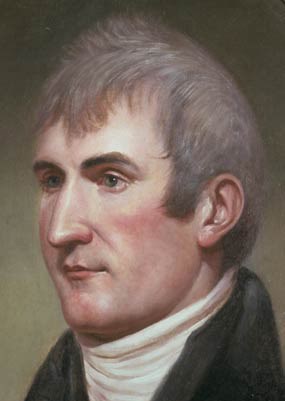Most of us have heard about the Lewis and Clark expedition.
Meriwether Lewis was a close friend of President Thomas Jefferson, who had
ordered the expedition. On September 3, 1809, Lewis set out for Washington,
D.C. to resolve a number of issues regarding his denied payments of drafts he
had drawn against the War Department while serving as governor of the Upper
Louisiana Territory. If the payments were granted, he face bankruptcy. Lewis
was not in good mental health at this point in his life. He was depressed and
had written his will before his journey and also attempted suicide but was
restrained.
Lewis stopped at an inn on the Natchez Trace, a very dangerous
and lawless place, called Grinder's Stand. After dinner, he retired to his
one-room cabin. In the innkeeper's wife, a lowly character named Priscilla
Grinder, said she heard gunshots. Servants rushed to Lewis’s cabin and found
Lewis badly injured from multiple gunshot wounds, one each to the head and gut.
He died shortly after sunrise from loss of blood. Money that Lewis had borrowed
from a friend, Major Gilbert Russell, at Fort Pickering to complete the journey
was missing.
Historians generally agree that the account of the events
attributed to Priscilla Grinder are fabricated.. Grinder claimed Lewis acted
strangely the night before his death: standing and pacing during dinner and
talking to himself in the way one would speak to a lawyer, with face flushed as
if it had come on him in a fit. She continued to hear him talking to himself
after he retired, and then at some point in the night, she heard multiple
gunshots, a scuffle, and someone calling for help.
She claimed to be able to see Lewis through the slit in the door
crawling back to his room. However, she never explained why she never
investigated further at the time, but only the next morning sent her children
to look for Lewis's servants.
She also claimed that three men followed Lewis up the Natchez
Trace, and he pulled his pistols on them after they came to his cabin that
night. Grinder said, in this account, that she heard voices and gunfire in
Lewis's cabin about 1:00 am. She found the cabin empty and a large amount of
gunpowder on the floor. Thus, in this account, Lewis's body was found outside
the cabin.
Lewis's relatives and contended it was murder. (When William
Clark and Thomas Jefferson were informed of Lewis's death, both accepted the
conclusion of suicide) A coroner's jury held an inquest immediately after
Lewis's death as provided by the local government but proved fruitless.
There are some factors that may support Lewis's suicide
including big debts, heavy drinking, possible morphine and opium use, failure
to prepare the expedition's journals for publication, repeated failure to find
a wife, and the deterioration of his friendship with Thomas Jefferson.
Some 40 years later, in 1848, the Tennessee State Commission
decided to erect a monument Lewis’s grave. Dr. Samuel B. Moore ordered Lewis's
grave to be opened and reported that “it (The death) seems to be more probable
that he died by the hands of an assassin."
